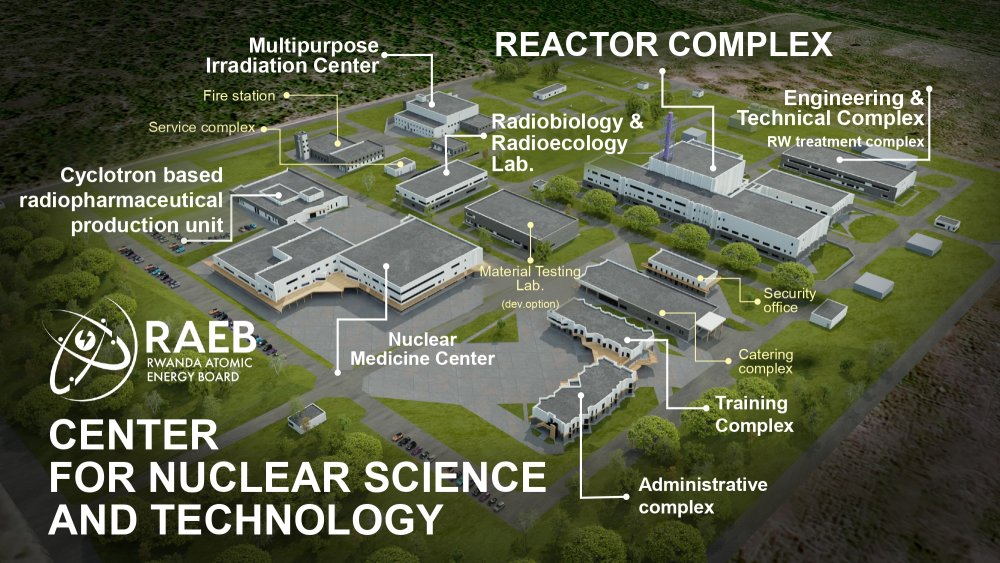Rwanda has announced ambitious plans to establish a Centre for Nuclear Science and Technology (CNST) over the next five years, signaling a significant step toward integrating nuclear technology for peaceful purposes in the nation’s development. According to Robert Nyamvumba, the Energy Division Manager at Rwanda’s Ministry of Infrastructure, the government is in active discussions with Russia’s State Atomic Energy Corporation (ROSATOM) to lay the groundwork for the center’s development, which will be located in the Bugesera Industrial Park.
“Rwanda envisions having a Centre for Nuclear Science and Technology in the nearest future,” said Mr. Nyamvumba. “Last year, we signed a cooperation agreement on the use of atomic energy for peaceful purposes. Other countries are using nuclear science to improve quality of life, and Rwanda can achieve the same. We need to move faster.”
Building a Framework for Nuclear Innovation
The collaboration with ROSATOM will include the establishment of both soft and physical infrastructure to support nuclear applications across multiple sectors, including agriculture, healthcare, education, and energy. Mr. Nyamvumba emphasized that these advancements will be underpinned by a robust legal and policy framework, enabling Rwanda to leverage nuclear technology responsibly and effectively.
“Rwanda’s vision includes the construction of a research nuclear reactor that will support advanced radiological applications, such as cancer treatment, food processing, and agricultural production enhancement,” Mr. Nyamvumba added. The center’s anticipated projects aim to boost cassava and rice yields through radiation technologies, enhancing food security and economic resilience.
In addition to developing infrastructure, Rwanda and ROSATOM plan to implement nuclear science study programs. With technical support from the International Atomic Energy Agency (IAEA), the University of Rwanda will train students at undergraduate, master’s, and doctoral levels, ensuring a skilled workforce to drive the nation’s nuclear science initiatives.
Advancing Nuclear Awareness and Public Acceptance
Dmitry Shornikov, CEO of ROSATOM Central and Southern Africa, underscored the importance of nuclear technology for Africa’s development, particularly in energy and agriculture. “Nuclear energy offers reliable and affordable power that can meet Africa’s growing energy demands,” said Shornikov, noting that nuclear facilities have an operational lifespan of 60 to 100 years, providing long-term energy stability.
He highlighted the advantages of radiation technology in agriculture, which can extend the shelf life of produce and reduce post-harvest losses. “By introducing radiation centers, we can significantly improve food preservation, which is critical for food security in Africa,” Shornikov stated.
Recognizing public concerns surrounding nuclear technology, Shornikov advocated for widespread awareness campaigns to educate Rwandans on the safety and benefits of nuclear power. “We need to educate people in simple terms that nuclear power plants don’t explode like bombs,” he emphasized, acknowledging that overcoming misconceptions is crucial for public acceptance and support.
Pioneering Nuclear Technology in Africa
With a target timeframe of 2023-2024, Rwanda’s CNST is set to position the country as a leader in peaceful nuclear technology applications within Africa. By investing in nuclear science, Rwanda aims to advance healthcare, boost agricultural productivity, and meet its energy needs in a sustainable manner, showcasing a model for other African nations considering nuclear technology.
The establishment of Rwanda’s CNST is a bold commitment to technological innovation and a significant step toward a future where nuclear science fuels sustainable development across Africa. Through partnerships with ROSATOM and support from the IAEA, Rwanda is poised to leverage nuclear advancements to achieve long-term growth and resilience.
